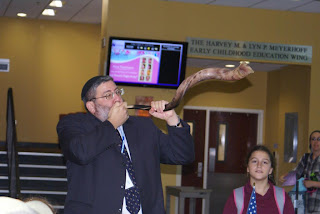Here is an article I wrote for our school newsletter:
As
the school year begins we focus
on Elul, Rosh
Hashanah and Yom
Kippur.( The High Holidays) If you ask most
students what these days mean
to them, they will tell you it is
a time for “Teshuvah.”
What
does Teshuvah
mean and how can
we make it real for our students?Literally
translated Teshuvah
means
to return. At this time of year
we return to Hashem ( G-D)and we
hope and pray that, as the
Navi ( Prophets) tells us, Hashem returns to us as well.
Most students, however,
will tell you that Teshuvah means
to say I
am sorry and ask for forgiveness. Yes, asking for forgiveness
is an element of the Teshuvah process, but
it is not the complete understanding of Teshuvah.
How
can we make the important and central theme of personal
growth practical and real for ourselves and,
more
importantly, for our students?
I
would like to share two thoughts on this topic. Thefirst
I learned last week when Rabbi Shmuel Silber, Rabbi
of Suburban Orthodox Toras Chaim, came to speak
to our students in grades five through seven. Based
on a Rashi in last week’s parsha ( Bible Portion ),
he said that the
reason we do a Chesed (act of kindness) is
not for the
recognition or the honor but because it is the right thing
to do and the Torah( Bible) told us to do it. When faced with
choices, at times the right choice can be unpopular or
not the “in thing” to do. Nevertheless it is the correct path
to follow. It reminded me of a quote that I saw, “Stand
up for what is right even
if you stand alone.” For our students
today, the message of making
the right choices is a very practical
and real one.
My
second thought on this topic stems
from research about setting goals
and dealing with change.
It is an idea that our Gedolim (sages)
have mentioned as well.
When setting goals, it is important that
our goals are small
and
attainable. I shared with the students
that during the first Gulf War in 1991, Jews around
the world were asked to increase their observance of mitzvot,( Commandments) tezedakah (Charity) and chesed( Acts of Kindness). It is said that someone
asked Rav Shach ZT”L what he would do differently, and
he answered that when he says Birkat HaMazon
(grace after meals), he will use a Birkon (bencher)
and not say it by heart. The lesson is clear. Even
one of greatest Gedolim knew that to achieve change
and growth small and attainable goals would need
to be set.
As we
enter this time of year, there are a lot of challenges and
great opportunities ahead of us. As educators we
strive to make the learning in all subject areas across
the Judaic and general studies come alive for
our
students. By connecting our learning to our world, we
become lifelong learners. May we all be zocheh (Merit) to see
great things from our children, our school and our community.

No comments:
Post a Comment